|
|
|
Sort Order |
|
|
|
Items / Page
|
|
|
|
|
|
|
| Srl | Item |
| 1 |
ID:
193633
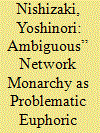

|
|
|
|
|
| Summary/Abstract |
Frequently cited in the literature on recent Thai politics, Duncan McCargo’s influential “network monarchy” concept is nonetheless inadequately developed. As such, it has been questioned and challenged by several scholars in recent years. In his 2021 Pacific Affairs article, McCargo rebuts many of these scholars’ arguments and defends his concept. His defence is unpersuasive, however. It falls short of elaborating on the scope, composition, and modus operandi of network monarchy, leaving the shortcomings of his original concept unrectified. Most seriously, McCargo now accentuates the “ambiguous” quality of network monarchy—a quality he did not emphasize originally—in order to accommodate new empirical anomalies and counter his critics. By so doing, he renders his argument unfalsifiable. Drawing on Robert Cribb’s thoughts, this article first spells out why or how the insufficiently developed network monarchy concept has become so widespread in the first place. It then examines the untenable nature of McCargo’s rejoinder to his critics, especially to Eugénie Mérieau.
|
|
|
|
|
|
|
|
|
|
|
|
|
|
|
|
| 2 |
ID:
175549
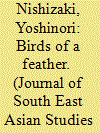

|
|
|
|
|
| Summary/Abstract |
This article attempts to illuminate Duncan McCargo's influential yet ambiguous concept of ‘network monarchy’ — the source of political power wielded by Thailand's royalist establishment. Drawing on Thai-language primary sources, especially cremation volumes, I argue, first, that many individuals who have made up various institutional components of the network monarchy come from a constellation of traditional royalist families that have intermarried with each other. Contrary to what McCargo suggests, these people are not just bound by their devotion to the monarchy alone, but also by their families’ pervasive intermarriage ties forged over many decades. These ties have given the network monarchy additional resilience, even though not all its members toe the ideological line all the time. My second argument concerns the temporal context in which the network monarchy has come into being. Although McCargo makes it seem that the late King Bhumibol developed the network monarchy — his personal patronage network — as a political tool from scratch in the post-1973 period, it has actually grown, in part, out of the pre-existing elite family networks. I develop these twin arguments by using the case of one royalist prime minister — Anand Panyarachun — as a focal point of analysis.
|
|
|
|
|
|
|
|
|
|
|
|
|
|
|
|
| 3 |
ID:
072208
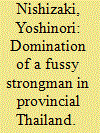

|
|
|
|
|
| Publication |
2006.
|
| Summary/Abstract |
Several scholars portray Thai provincial strongmen as having character traits associated with nakleng - 'tough guys' - who are violent and ruthless toward enemies, but generous and compassionate toward supporters. Banharn Silpa-archa, the strongman of Suphanburi province, does not fit the description however. His personality is reflected in the way he meticulously - fussily - monitors all local development projects. This surveillance pushes otherwise lazy and inefficient local civil servants to be more diligent in their work. Banharn's domination rests on Suphanburians' appreciation of his non-nakleng-type leadership.
|
|
|
|
|
|
|
|
|
|
|
|
|
|
|
|
| 4 |
ID:
164687
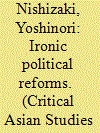

|
|
|
|
|
| Summary/Abstract |
An elected Senate and the party-list system are two institutional innovations of the 1997 Thai Constitution designed to support political reforms. This paper sheds light on one unintended effect of these reforms: they have allowed scores of political families to maintain or even tighten their grip on Parliament. Combining aggregate data and case studies, this paper shows that a sizable number of elected senators and party-list parliamentary members are related, by birth or marriage, to other parliament members elected in the post-1932 period. The well-intended reforms have concentrated parliamentary power in the hands of these families, many of which represent the excesses of Thailand’s full-blown electoral democracy. The survival and resilience of these families diminish reform opportunities by further entrenching corruption, clientelism, violence, and electoral fraud, as well as by deepening dynastic rule that militates against political pluralism and inclusiveness.
|
|
|
|
|
|
|
|
|
|
|
|
|
|
|
|
| 5 |
ID:
120006
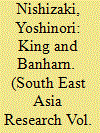

|
|
|
|
|
| Publication |
2013.
|
| Summary/Abstract |
Duncan McCargo's influential model of 'network monarchy' enables us to understand how King Bhumibol Adulyadej has mobilized his nationwide patronage network to shape contemporary Thai politics. This model, however, focuses mainly on the conflicts between reform-minded virtuous leaders (represented by Bhumibol) and unprincipled, self-serving politicians, and pays insufficient empirical attention to the porous boundaries between the two. The author makes up for this weakness by unravelling the historical process through which Bhumibol has developed a symbiotic, if ambiguous, relationship with Banharn Silpa-archa, regarded as the epitome of unscrupulous rural-based politicians. The author shows that the two have used each other for their respective political purposes. In an effort to protect and advance his personal and dynastic interests, Bhumibol has found it necessary and expedient to rely on Banharn as a valuable political ally. Banharn, for his part, has relied on the king and his proxies to legitimate and consolidate his authority at the local level. By casting light on this interdependence between the two seemingly contrasting types of leader, the paper contributes to a further elaboration of McCargo's model and, more generally, to a deeper understanding of the complexity of Thailand's patronage politics.
|
|
|
|
|
|
|
|
|
|
|
|
|
|
|
|
| 6 |
ID:
064845
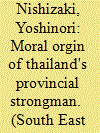

|
|
|
| 7 |
ID:
120251
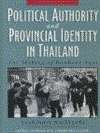

|
|
|
|
|
| Publication |
Ithaca, SEAP, 2011.
|
| Description |
xvii,254p.hbk
|
| Series |
Studies on South East Asia No.53
|
| Standard Number |
9780877277835
|
|
|
|
|
|
|
|
|
|
|
|
Copies: C:1/I:0,R:0,Q:0
Circulation
| Accession# | Call# | Current Location | Status | Policy | Location |
| 057276 | 959.3/NIS 057276 | Main | On Shelf | General | |
|
|
|
|
| 8 |
ID:
108401
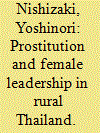

|
|
|
|
|
| Publication |
2011.
|
| Summary/Abstract |
For all the attention paid to the economic, social, and moral dimensions of prostitution in Thailand, no scholar has thus far conducted an empirical study of the relationship between the vice and political change in the countryside, where most sex workers come from. Using the case of Phayao Province in northern Thailand, I attempt to redress this lacuna. I show how rampant prostitution, the most acute social issue in Phayao, has ushered in the rise to power of one virtuous woman from an ethnic minority family-Ladawan Wongsriwong. Located on the economic and social margins of Thailand, many village families in Phayao traditionally relied on prostitution for income, causing a massive influx of young girls into the lucrative sex industry in Bangkok and abroad. In the 1990s, however, AIDS started taking a heavy toll on Phayao's small population. Against this backdrop, Ladawan emerged as a prominent female leader in the male-dominant rural society of Phayao by conducting an extensive issue-oriented campaign against prostitution. This case questions much of the literature on rural politics and female leadership in democratizing Southeast Asia that underestimates the importance of social issues.
|
|
|
|
|
|
|
|
|
|
|
|
|
|
|
|
|
|
|
|
|